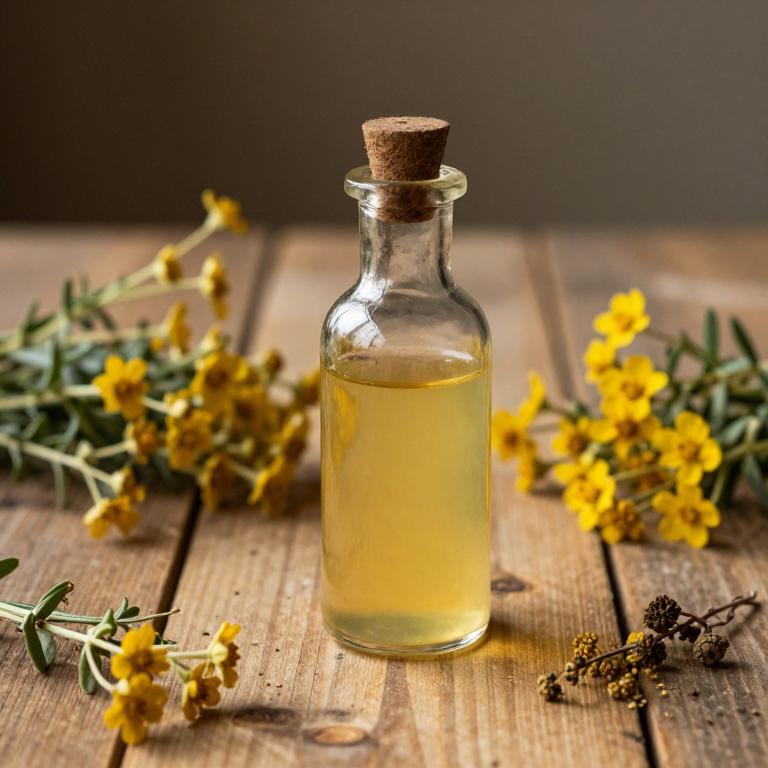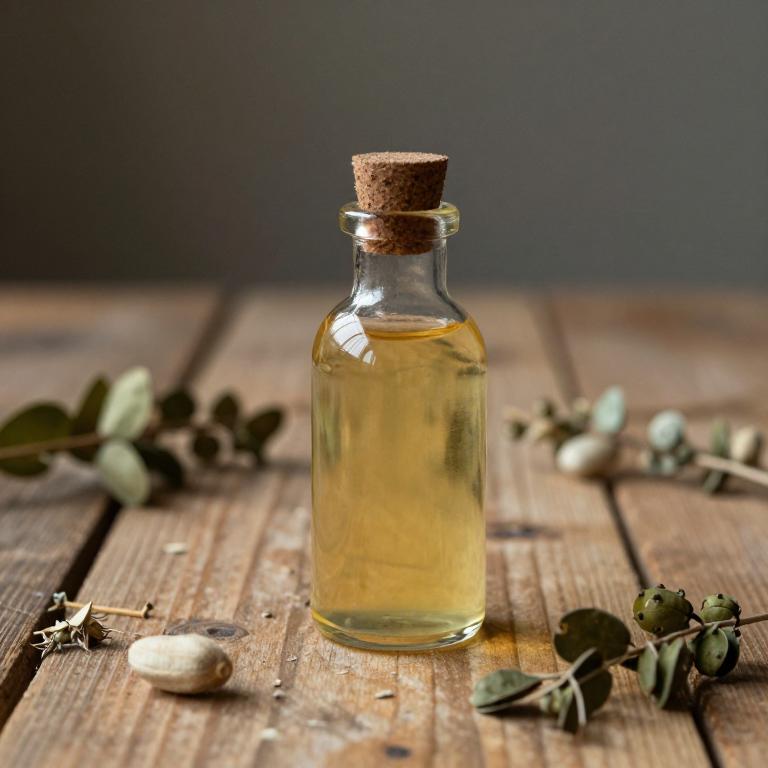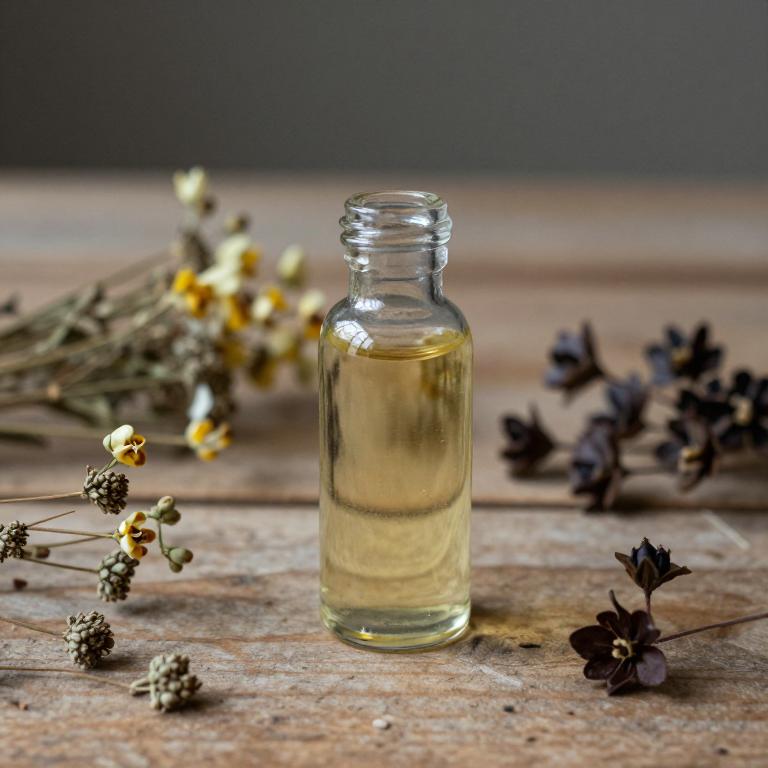10 Best Herbal Juices For Infection

Herbal juices have gained attention for their potential to support the body's natural defenses against infections by providing essential nutrients and bioactive compounds.
Certain herbs such as echinacea, garlic, and ginger are commonly used in herbal juices due to their antimicrobial and immune-boosting properties. These juices can help reduce inflammation, enhance immune function, and promote faster recovery from bacterial or viral infections. However, it's important to note that while herbal juices may offer supportive benefits, they should not replace conventional medical treatments for serious infections.
Always consult with a healthcare professional before using herbal remedies, especially for persistent or severe infections.
Table of Contents
- 1. Echinacea (Echinacea purpurea)
- 2. Aloe vera (Aloe barbadensis)
- 3. St. john's wort (Hypericum perforatum)
- 4. Ginger (Zingiber officinale)
- 5. Stinging nettle (Urtica dioica)
- 6. Thyme (Thymus vulgaris)
- 7. Turmeric (Curcuma longa)
- 8. Ceylon cinnamon (Cinnamomum verum)
- 9. Salvia (Salvia officinalis)
- 10. Geranium (Pelargonium graveolens)
1. Echinacea (Echinacea purpurea)

Echinacea purpurea, commonly known as purple coneflower, is a popular herbal remedy often used to support the immune system and potentially reduce the severity and duration of colds and respiratory infections.
Herbal juices made from Echinacea purpurea are believed to contain compounds such as alkamides, caffeic acid derivatives, and polysaccharides, which may help stimulate immune responses and combat viral infections. While some studies suggest that echinacea may have antiviral and anti-inflammatory properties, the evidence regarding its effectiveness in preventing or treating infections remains mixed and requires further research. These herbal juices are typically consumed as a tonic or in capsule form, and their use should be discussed with a healthcare provider, especially for individuals with allergies or chronic health conditions.
Despite its traditional use, the scientific consensus on echinacea's role in infection management is still evolving.
2. Aloe vera (Aloe barbadensis)

Aloe barbadensis, commonly known as aloe vera, has been widely used for its potential therapeutic properties, including its role in supporting the body's natural defenses against infections.
The gel extracted from the plant contains various bioactive compounds such as polysaccharides, enzymes, and antioxidants, which may help reduce inflammation and promote healing. Some studies suggest that aloe vera juice could have antimicrobial properties that may inhibit the growth of certain bacteria and fungi. While it is often used topically for skin infections, some people consume aloe vera juice to support internal health and immune function.
However, it is important to consult a healthcare professional before using it for infections, as its efficacy and safety for specific conditions can vary.
3. St. john's wort (Hypericum perforatum)

Hypericum perforatum, commonly known as St. John's Wort, has been traditionally used for its potential antimicrobial properties, making it a subject of interest in herbal medicine for treating infections.
The plant contains bioactive compounds such as hypericin and hyperforin, which may exhibit antibacterial and antifungal effects. Herbal juices made from Hypericum perforatum are believed to support immune function and may help in managing certain types of infections, although scientific evidence is still limited. While some studies suggest its efficacy against specific pathogens, more research is needed to confirm its role in infection treatment.
As with any herbal remedy, it is important to consult a healthcare professional before using Hypericum perforatum, especially when taking other medications due to potential interactions.
4. Ginger (Zingiber officinale)

Zingiber officinale, commonly known as ginger, has been widely used for its medicinal properties, including its potential to support the body in fighting infections.
Ginger contains bioactive compounds such as gingerol and shogaol, which exhibit antimicrobial and anti-inflammatory effects. Herbal juices made from fresh ginger can help boost the immune system and may aid in reducing symptoms associated with viral and bacterial infections. These juices are often consumed as a natural remedy to alleviate nausea, support digestion, and enhance overall wellness during illness.
While ginger is not a substitute for medical treatment, incorporating it into a balanced diet may complement conventional approaches to managing infections.
5. Stinging nettle (Urtica dioica)

Urtica dioica, commonly known as stinging nettle, has been traditionally used in herbal medicine for its potential anti-inflammatory and antimicrobial properties.
When prepared as a juice, it may support the body's natural defenses against infections due to its high concentration of vitamins, minerals, and antioxidants. Some studies suggest that nettle juice may help reduce symptoms of urinary tract infections and other inflammatory conditions. However, it is important to consult a healthcare professional before using it as a treatment, especially for persistent or severe infections.
While it can be a complementary remedy, it should not replace conventional medical treatments for infections.
6. Thyme (Thymus vulgaris)

Thymus vulgaris, commonly known as thyme, is a herb widely used in traditional medicine for its antimicrobial and immune-boosting properties.
Thyme contains essential oils, particularly thymol, which exhibit strong antibacterial, antifungal, and antiviral effects, making it effective against various infections. Herbal juices made from thyme can be consumed to support the body's natural defenses and aid in the treatment of respiratory infections, urinary tract infections, and skin conditions. These juices are often prepared by combining fresh or dried thyme with other immune-supporting herbs like garlic or echinacea for enhanced benefits.
However, it is important to consult a healthcare professional before using thyme-based remedies, especially for individuals with allergies or chronic health conditions.
7. Turmeric (Curcuma longa)

Curcuma longa, commonly known as turmeric, contains curcumin, a powerful bioactive compound known for its anti-inflammatory and antimicrobial properties.
Turmeric-based herbal juices have been traditionally used to support the body's natural defenses against infections due to their ability to inhibit the growth of harmful bacteria and viruses. These juices may help reduce inflammation and oxidative stress, which are often associated with various infectious diseases. However, while preliminary studies suggest potential benefits, more research is needed to fully understand their efficacy and optimal usage in treating infections.
As with any herbal remedy, it is advisable to consult a healthcare professional before incorporating turmeric juice into a treatment regimen.
8. Ceylon cinnamon (Cinnamomum verum)

Cinnamomum verum, commonly known as true cinnamon, has been traditionally used in herbal remedies for its potential antimicrobial properties.
The essential oils and compounds found in cinnamon, such as cinnamaldehyde and eugenol, exhibit antibacterial and antifungal effects, making it a natural candidate for combating infections. Herbal juices made from cinnamon may help support the immune system and reduce the severity of certain infections when consumed as part of a holistic approach to health. However, while preliminary studies suggest its benefits, more research is needed to fully understand its efficacy and safety in treating infections.
It is advisable to consult a healthcare professional before using cinnamon-based remedies for medical conditions.
9. Salvia (Salvia officinalis)

Salvia officinalis, commonly known as sage, has been traditionally used for its antimicrobial properties, making it a valuable ingredient in herbal juices for infection management.
The plant contains compounds such as thujone and rosmarinic acid, which exhibit antibacterial and antifungal effects, helping to combat various types of infections. Herbal juices made from sage leaves can support immune function and may help reduce symptoms associated with respiratory and urinary tract infections. However, it is important to use sage in moderation, as excessive consumption may lead to adverse effects, especially in pregnant women or those with certain medical conditions.
As with any herbal remedy, it is advisable to consult a healthcare professional before incorporating sage-based juices into a treatment regimen for infections.
10. Geranium (Pelargonium graveolens)

Pelargonium graveolens, commonly known as geranium, has been traditionally used in herbal medicine for its potential antimicrobial properties.
Extracts from its leaves and flowers are often prepared as herbal juices, which are believed to support the body's natural defenses against infections. These juices contain compounds such as geraniol and other essential oils that may help inhibit the growth of bacteria and fungi. Some studies suggest that pelargonium graveolens may be useful in treating mild respiratory and urinary tract infections when used as part of a holistic approach.
However, it is important to consult with a healthcare professional before using these herbal juices, especially for persistent or severe infections.